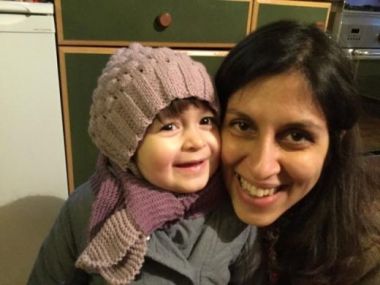Why Boris Johnson should get the Church's help in persuading Iran to free Nazanin Zaghari-Ratcliffe
All of Britain is gripped by the saga of Nazanin Zaghari-Ratcliffe, the British-Iranian woman detained in Iran. The pictures of her 2-year old daughter, Gabriella, are in every paper – pining for her missing mother. Her husband, Richard Ratcliffe, has dominated airwaves with extraordinary dignity.
He has been fighting for his wife's liberation since she was detained by Iran's Revolutionary Guard in March when taking her little girl to visit her grandparents.

Ms Zaghari-Ratcliffe works as a project manager for the Thomons Reuters Foundation and has also worked for the BBC Persian Service. Journalists who know Iran and can speak farsee, and the BBC, are both enemies in the eyes of Iranian hardliners.
But there is no evidence that she was working on Iranian politics and her job was administrative rather than journalistic.
Richard Ratcliffe launched an on-line petition in June which attracted 1.24 million signatures and was hopeful that he might get wife wife back home until an extraordinary blunder by the Foreign Secretary, Boris Johnson. He told the House of Commons she was involved in training journalists in Iran.
The Iranian embassy in London monitors carefully every remark by British politicians and this utterly wrong statement by Britain's highest foreign policy person was seized on in Tehran by hardliners who promptly increased Ms Zaghari-Ratcliffe's sentence to five years.
After endless front page and TV bulletin criticisms, Boris Johnson has withdrawn his statement and apologised for this crass remark.
But who can actually get help get Ms Zaghari-Ratcliffe home? There is a precedent involving the Catholic Church.
In March 2007, the Iranians detained four Royal Navy sailors whose navigation skills were so poor they crossed into Iranain waters in a small boat.
I was serving as a UK delegate on the Council of Europe after 8 years of political work in the Foreign and Commonwealth office culminating as deputy to the Foreign Secretary and minister of Europe.
In that capacity I had come to learn about and admire the extraordinary reach of the Vatican's diplomatic network.
Know as papal nuncios these men are amongst the most skilled, professional diplomats in the world with literally centuries of experience and diplomatic savoir faire to call upon.
When I was minister responsible for Latin America and the Balkans I made a point of meeting Vatican diplomats as often they have sharper, shrewder insights into what was going on from the local clergy in the countries they were posted to.
The FCO is institutionally an Anglican ministry and the many years of anti-Catholic passions in England dating back to the 16th century, while not valid, still are in the FCO's genetic profile.
In a foolish bit of FCO cost-cutting when I was Europe minister, FCO anti-Catholic bean-counters had proposed to merge the bi-lateral UK embassy with Italy with the embassy to the Vatican.
As Europe minister I was told by officials the Vatican had signed off on this. This was not true. I had my own contacts who confirmed that Rome was completely opposed to the UK reducing the rank and status of its ambassador to the Holy See to a secondary figure sitting in a back-office in the main UK embassy in Rome. So I quashed the idea.
I am glad I did because in March 2007, the Iranians detained the four Royal Navy sailors.
By chance, at the time I was staying in Rome with a friend, Francis Campbell, who was UK ambassador to the Holy See and is now a university vice chancellor.
When the news of the Royal Navy arrests broke I contacted Tony Blair's office in Downing Street and suggested we use the Pope as an intermediary. Campbell had excellent contacts and got to work.
In the end the Pope, Benedict XVI, addressed a fraternal message to the supreme ayatollah as one church leader to another saying that at Easter time it was right for families to be united.
It wasn't quite en clair but it allowed Iran enough face to let the British sailors go home.
The case of the four Royal Navy sailors who could not read a map is not the same as Ms Zaghari-Ratcliffe. But in Iran it is religious leaders who have supreme authority so it would make sense for London to approach the Vatican quietly and see if the Church can help.
The same is true for the Church of England and even for senior Muslim religious leaders in the UK.
The MP Tom Tugendhat who chairs the House of Commons Foreign Affairs Committee has taken up the idea and asked Johnson to use the good offices of religious leaders.
It is reported by Christian Today that Johnson has not bothered to contact with the Vatican nor Lambeth Palace to enlist their help. If so it is yet another reason why his period as Foreign Secretary is so sad.
But all this had to happen without publicity as the last thing the Iranian rulers will do is bow to noisy rent-a-quote pressure from British MPs or headlines in the press.
A period of silence from ministers, MPs and the press would probably help.
In today's world where force and classical diplomacy are less and less effective, other ways of getting governments to behave well are needed. Using the diplomatic outreach of churches can serve a purpose and should be used in the case of Nazanin Zaghari-Ratcliffe.
Denis MacShane is a former minister for Europe.











